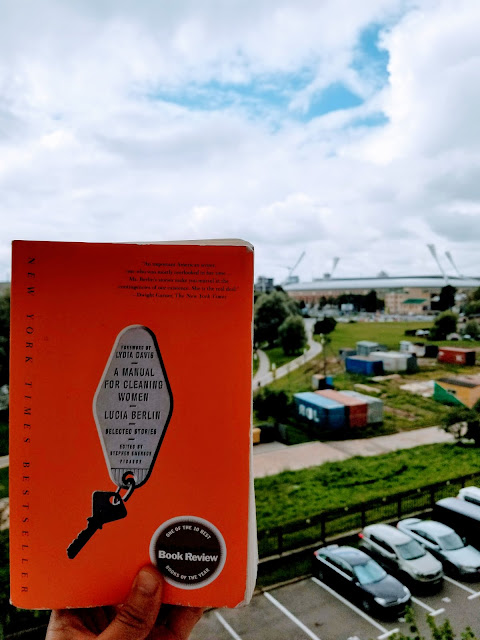A manual for cleaning women
During my first year in Columbia I lived two buildings away from a bookstore. Everyday they put a rack outside with the deals of the day. I inevitably always stopped and checked the titles more out of curiosity than with the firm purpose of buying a new book since I made myself a commitment of not buying another one until I finish the pile of books that I bought on a shopping frenzy.
Before coming to Belarus I needed to move out, make some laundry, move all my stuff from here to there, so that last week in NYC I walked past the bookstore rack a solid 50 times and that's when I saw the unmistakable color of this book's cover. I remembered that I saw it years ago in that book review, and I decided to take it with me to my summer adventure.
Lucia Berlin was born in the US. Reading her biography you learn that she grew up with alcoholic parents who were always on the run. Born in Alaska, she moved to Texas, Santiago de Chile, Mexico City, New Mexico, and California to name few. She was also tormented by alcoholism but her work was prolific nonetheless.
To support her four sons she worked cleaning houses and during her lifetime she didn't achieve fame or recognition. She died in 2004, but eleven years after "A manual for cleaning women", a volume that collected some of her selected stories, hitted the New York Times bestseller list.
The short stories collected in this book, at first, seem randomly selected. You start reading thinking that fictional characters are telling a story only linked by women performing cleaning duties in private homes. You get fooled until all of the sudden you realize that these stories are too personal to be a product of imagination, they include so many details, lingo, descriptions, emotions, that you start thinking that the book can be catalogued as an autobiography. You read some more, and you get fooled again and you don't know what to think, but you don't care.
Every story portrays women exposing what they are and what they feel. What I like about this book is that, instead of "giving complexity to the female characters" (as many movies, books, and artistic expressions boast of doing nowadays), women in this book just are who they are. No one gives them complex features, they are not passive characters waiting to be redeem by a history characterized by men being protagonist or the catalyst of women empowerment. In this book men are just one part of the history and sometimes barely needed just as incidental elements of the woman's story.
Every story seems to have a different protagonist without relation to the previous one, they are substantially different and yet very similar. Makes you think in yourself. As a person, you are defined by the people you are surrounded with, by the context, the time, and your actions in any given situation. You are not a monolith, and Berlin's characters shouldn't be neither. That raises the question again. The protagonist is the same person in every story? Is Lucia writing about herself?
When you are approaching the end of the book, you start reading the same names, the same problems in different situations, and there's a sense of continuity in all the stories. The alcoholic mother, the absent father, the torrid romances, life in Chile and Mexico, fighting her own alcoholism, working cleaning houses, everything seems too fitting to not think about Lucia's life; but she never yields and never confesses. You never know. Here is where the beauty of this book lies. It can be anyone and at some points it can be everyone. You go on a journey with these women and recognize yourself because you also love, you also suffer, and you also feel. Because, despite what cultural and gender-based norms try to dictate to us, we are all complex in our own means.
PS. I enjoyed the stories that happen in Mexico. I have always been jealous of foreigners who can see with curious and new eyes what I have normalized during my life. Sometimes it takes someone else to tell you the little details you have always lived with to remember them and cherish them.


Comentarios
Publicar un comentario